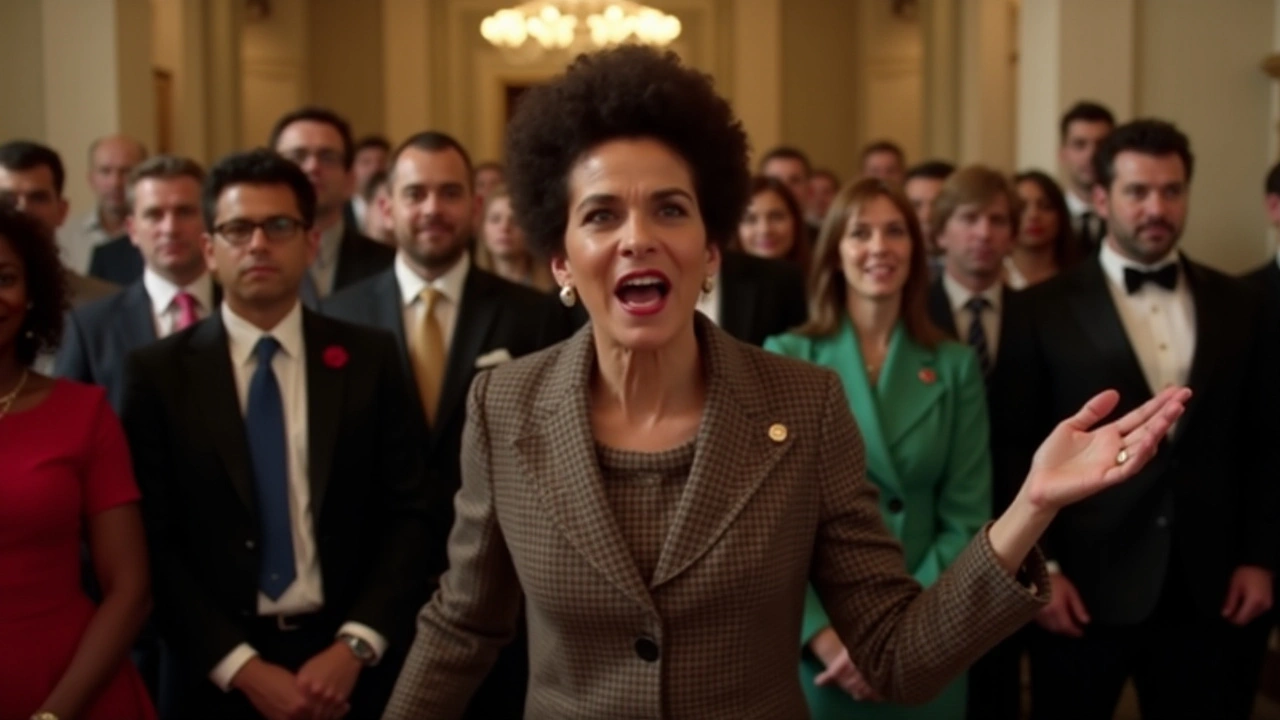
Lidia Thorpe's Bold Stand Against the Royal Visit
Lidia Thorpe, an independent Indigenous Australian senator, took a bold stand during the recent royal visit of King Charles and Queen Camilla to Australia. On a placid Monday at Canberra's Parliament House, the ceremonial atmosphere was disrupted as Thorpe, donning a traditional possum-skin cloak, positioned herself at the head of a cadre of Members of Parliament. The royal couple had just initiated their visit, aimed at celebrating Australia's longstanding ties with the monarchy, but Thorpe's presence introduced a palpable tension in what many expected to be merely a pageant of nostalgia.
Anticipating the traditional entrance of the royals into the Great Hall, Thorpe waited defiantly. However, the monarchy's handlers opted for a discreet entrance through a rear door, attempting to avoid a direct confrontation. Undeterred, Thorpe made her way to the stage after King Charles gave his speech, which touched upon climate change and the country's progress towards reconciliation. In a move that left the hall in a hushed awe, she loudly proclaimed, "This is not your land," and followed quickly with, "You are not my king," a declaration that echoed the sentiments of many Indigenous Australians regarding the British monarchy's colonial past.
The Symbolic Importance of Thorpe's Protest
Thorpe's protest was more than a disruption; it was a symbolic gesture rooted in a deep and painful history. She called for a treaty, a formal recognition of the sovereignty of Australia's First Peoples, and accused the monarchy of historical injustices related to land appropriation. Her actions were met with swift eviction from the hall by security personnel, yet her voice continued to resonate from the foyer as she exclaimed, "Fuck the colony." This metaphorical bursting of the 'warm bubble' that surrounded the royal visit showcased the persistence of unresolved colonial legacies in Australian society.
The murmurs of acknowledgment from Prime Minister Anthony Albanese, during his welcome address, could not overshadow Thorpe's stark reminder. Albanese had subtly hinted at the evolving nature of national identity, mentioning that "nothing remains static." His words, though diplomatically poised, couldn't capture the rawness of Thorpe's outcry for justice and recognition that reverberated within the chambers of Parliament House.
Protests Highlight Colonization and Indigenous Rights
Prior to the parliamentary protest, Thorpe joined fellow activists at the Australian War Memorial, aligning with a group of about 20 protesters. Displaying Aboriginal and Palestinian flags, they chanted powerful phrases such as "no pride in genocide" and reiterated the enduring truth that Australia "always was, always will be, Aboriginal land." These acts of protest aimed to underscore the ongoing struggle for Indigenous rights and position the narrative of colonization centrally in national discourse.
King Charles, amidst the distilled ceremonial language of his address, acknowledged the "clear signs of climate change" and pointedly commended Australia's initiative towards a "better, safer future." He briefly touched on the nation’s challenging journey towards reconciliation, drawing on the historical wisdom of Australia's First Peoples as a guide. Yet, Thorpe's interruption served as a poignant reminder that the journey towards reconciliation isn't merely ceremonial but deeply intertwined with political will and social justice.
The Divergence of Nostalgia and Future Aspirations
The visit by King Charles and Queen Camilla, representing more than a tie to Australia’s colonial history, raised intricate questions about the nation's future identity. Thorpe's protest highlighted a divergence between nostalgia for the past and aspirations for a future defined by recognition and inclusion. Peter Dutton, in a light-hearted address, recognized the growing calls for independence and the republic movement with a quip about "republicans" primed in their suits and shoes sensing a shift in sentiment towards self-governance.
While the royal itinerary attempted to solidify the monarchy's connection to Australia, Thorpe's actions emphasized that this association reflects more of the nation's past than its future dreams. Her insistence on a treaty and recognition of Indigenous sovereignty reiterated a crucial narrative often overshadowed by ceremonies. As Australia's identity continues to evolve, debates about sovereignty, historical justice, and national acknowledgment of its Indigenous peoples' plight remain prominent.
A Continuing Conversation on National Identity
The fervor surrounding Thorpe's protest at the royal visit is a testament to the ongoing dialogue about national sovereignty and Indigenous rights. It serves as a stark reminder that Australia's path toward defining its identity requires more than ceremonial pomp; it demands a confrontation with uncomfortable truths and a commitment to rectifying historical wrongs. The narrative woven by figures like Thorpe is indispensable to this nation's story, urging both citizens and leaders to engage in a conversation that is as necessary as it is challenging.
In a modern-day world where traditions and institutions are increasingly scrutinized, the call for a treaty and genuine reconciliation becomes not merely a demand from Indigenous voices but a crucial component of shaping a united and just society. This royal visit, while steeped in tradition, has laid bare the complexities of Australia's ongoing journey toward recognizing its Indigenous heritage and paving a path towards genuine inclusion for all its citizens.